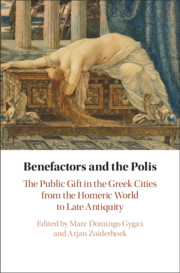 Benefactors and the Polis
Benefactors and the Polis from Part IV - Benefactors and the Polis under Rome
Published online by Cambridge University Press: 21 January 2021
Of all types of Greek benefaction, agonistic festivals – that is, festivals that revolved around athletic, dramatic or cultural contests – may have been the most central to the phenomenon of civic euergetism in the Greek cities of the Hellenistic and Roman period. Core questions of the chapter are: What was the significance of the fact that public festivals were paid and organised by private benefactors? Why did benefactors do this? And what was it that cities stood to gain? The main argument is that agonistic festivals were not simply an object of euergetism but also a medium through which euergetism evolved. They not only were an opportunity for elite benefactors (and athletes) to increase their prestige but were primarily mass events where benefactors and their communities were jointly involved in representing the central social, cultural and political values of the time.
To save this book to your Kindle, first ensure [email protected] is added to your Approved Personal Document E-mail List under your Personal Document Settings on the Manage Your Content and Devices page of your Amazon account. Then enter the ‘name’ part of your Kindle email address below. Find out more about saving to your Kindle.
Note you can select to save to either the @free.kindle.com or @kindle.com variations. ‘@free.kindle.com’ emails are free but can only be saved to your device when it is connected to wi-fi. ‘@kindle.com’ emails can be delivered even when you are not connected to wi-fi, but note that service fees apply.
Find out more about the Kindle Personal Document Service.
To save content items to your account, please confirm that you agree to abide by our usage policies. If this is the first time you use this feature, you will be asked to authorise Cambridge Core to connect with your account. Find out more about saving content to Dropbox.
To save content items to your account, please confirm that you agree to abide by our usage policies. If this is the first time you use this feature, you will be asked to authorise Cambridge Core to connect with your account. Find out more about saving content to Google Drive.